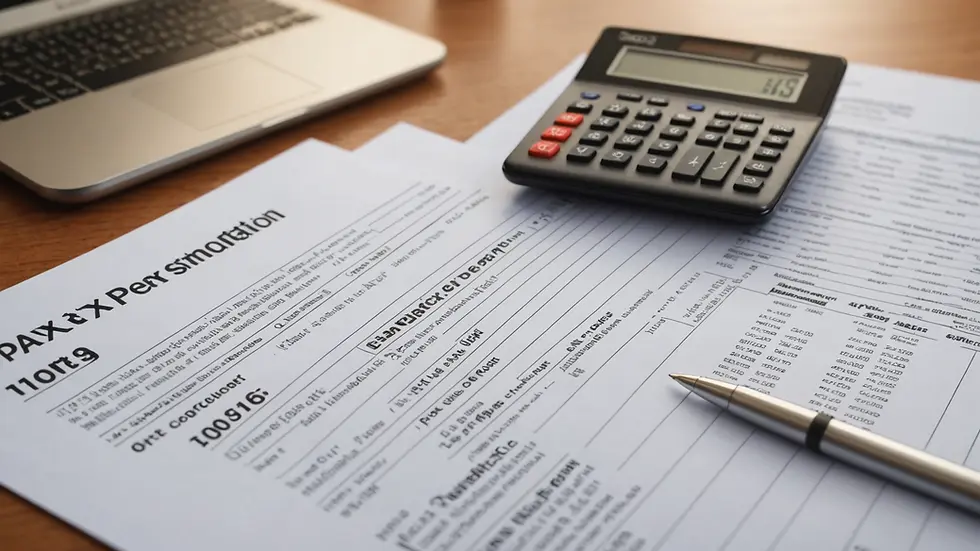Comparing Refunds: Do Tax Preparers Get Higher Refunds Than DIY Tax Prep?
- mscarmenlewis09
- Jan 18, 2025
- 3 min read
When tax season arrives, individuals face an important choice: should they prepare their taxes themselves or hire a professional tax preparer? This decision can significantly impact the size of your tax refund. Research indicates that tax preparers often deliver larger refunds than those who file on their own. In this post, we will examine several key factors surrounding this question and talk about the effectiveness of professional tax services versus DIY tax preparation.
Understanding the Basics of Tax Preparation
Tax preparation involves collecting financial data, filling out necessary forms, and correctly reporting income and deductions to the IRS. For many people, this task can feel overwhelming due to the complexity of tax laws, credits, and forms.
Many individuals use tax software to simplify the process, but a steep learning curve exists. Those unfamiliar with the latest tax regulations often overlook significant deductions. For example, insights from H&R Block indicate that taxpayers who use their services receive an average refund of $2,500, compared to $800 for self-filers. This highlights how professional assistance can yield a better outcome.
Professional tax preparers possess the training and experience to navigate the intricacies of tax law. They stay informed about the latest changes and can identify opportunities that might be missed by the average taxpayer.
The Role of Expertise in Maximizing Refunds
One of the biggest advantages of hiring a tax preparer is their expertise. Professionals have a thorough understanding of the tax code, enabling them to provide insights that a DIY taxpayer may not be aware of.
Statistics show that approximately 77% of taxpayers who use tax professionals report receiving larger refunds compared to those who file on their own. For instance, tax preparers often know about specific credits and deductions that certain professions qualify for, such as:
Educator expenses: Teachers have access to some tax credits.
Home office deductions: For those who run businesses from home, proper calculation can lead to substantial savings.
Child and dependent care credits: Families can claim up to 35% of qualifying expenses, depending on their income.
These insights can translate to significant changes in the final refund amount.
Technology in Tax Preparation
Advancements in technology have given rise to virtual tax preparation, which offers a middle ground between DIY and professional help. Online platforms allow users to navigate the tax preparation process with expert guidance thru the entire process.
Virtual tax providers can charge a flat fee or a percentage of your refund. These services typically offer a user-friendly experience while ensuring that users do not miss key deductions. A study found that clients using hybrid services reported a 15% higher average refund than those who opted for DIY options.
As more people turn to the Internet for solutions, virtual tax preparation is especially appealing to tech-savvy individuals seeking convenience and savings. Easing access to remote bookkeeping for small business, or the comfort of having someone available to help with IRS communications.
Making the Right Choice
In the end, deciding between hiring a tax preparer and preparing taxes independently depends on personal circumstances and preferences. Those with more complex tax situations can easily reap substantial benefits from professional assistance. The National Society of Accountants reported that 86% of taxpayers who used a professional were satisfied with their choice. Furthermore, professionals can help avoid costly errors that may lead to penalties or audits, providing peace of mind that isn’t easily measured.
As tax season approaches, take time to evaluate your financial landscape. Carefully consider the advantages of professional tax preparation to ensure you receive the maximum refund possible. Understanding these potential benefits is crucial for achieving financial peace of mind.

Ultimately, the goal remains the same: maximizing your refund while ensuring compliance with tax laws. Whether you decide to tackle your taxes yourself or seek professional help, being informed and proactive is essential for a successful tax-filing experience.
_PNG.png)



Comments